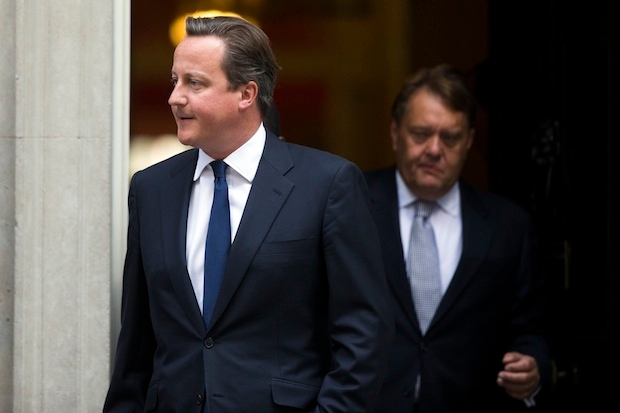It’s two weeks since David Cameron looked rather sick in the House of Commons and Labour MPs jeered ‘resign’ following his defeat on Syria. On that night, all sorts of wild predictions were flying around about what this meant for the Prime Minister. But even some of the more sanguine commentary looked rather misplaced this week when Cameron was able to stand up at PMQs and produce a range of punchy jokes about how weak Ed Miliband was. Could a Prime Minister who had just lost a vote on a matter of war really call the leader of the opposition weak?
Cameron’s wounds have healed a little quicker than many of us thought, to the point that he is starting conference season in a reasonable position. He’s not exactly riding the crest of the wave that brought him in from the summer recess – the Syria vote pushed him off that – but neither is he thrashing about trying to keep his head above the water. Perhaps now that I’ve written that, the tide will change again.
The tributes to Margaret Thatcher earlier this year left a deep impression on the Prime Minister, and he has tried to pick up at least one of her habits: that of writing notes to MPs to thank them for their efforts on certain policies. He has been writing letters again in the past fortnight: thanking those MPs in particular who opposed intervention but who supported the government on the night. His henchmen have also been working hard, holding debrief meetings with MPs to work out what went wrong. And last night John Hayes, the PM’s backbench envoy, held a reception for backbenchers in Downing Street.
One of the government’s greatest saving graces in the aftermath of the defeat was that things are going so well domestically. And George Osborne was able to drive that point home again this week, with his most upbeat speech yet on the economy. But he also held a briefing for Conservative MPs on Tuesday night in which he repeated his message about the economy turning the corner. I understand that the Chancellor told backbenchers about the stats they should be highlighting to the electorate that show the economy is on the up. The leadership knows how well Tory MPs have responded to being given a clear plan and clear instructions on how to get at Labour with facts and figures, and this week’s briefing suggests that the tightly-planned summer grid has continued into the autumn.
By contrast, Labour doesn’t have a plan, and it knows it doesn’t have a plan. Senior party sources tell me they are aware of the need to tell backbenchers what it is that the leadership is doing so that Conservative-style chaos doesn’t ensue. They’ve got plenty of examples of Conservative-style chaos on Europe to understand what it is that causes these ructions: often it’s a failure to brief MPs behind the scenes and to get some of the key strategy out via commentators.
Furthermore, what there is of Miliband’s plan involves a bruising and esoteric discussion about expanding the party membership by reforming the trade union link. One shadow cabinet member remarked to me this week that ‘we all wish we’d done this a year earlier with Refounding Labour as we’ll be talking about this far too close to the general election for most people’s liking’. Labour is distracted, while the Conservatives are largely behaving as though they are on a general election war footing already.
Those Conservatives who care less about general elections and more about their personal hatred of David Cameron have stayed largely quiet, too. I understand that the whips believe the hardcore of 20 MPs who really want the PM gone hasn’t grown recently – although this may say as much about their intelligence-gathering methods as it does about anything else – and that this hardcore remains reasonably manageable. The Syria vote was bad because MPs were voting on the principle of intervention rather than the motion, but this was about a specific issue more than it was about the PM himself One loyalist MP tells me ‘you had silly buggers with some of Adam [Afriyie]’s gang, but they were divided themselves’. That hasn’t stopped Afriyie continuing his attempts to advance his empire: backbenchers say he’s still ‘on manoeuvres’. Still, other MPs who hate Cameron are still plotting away: some with little black books of stories they think they can use if the going gets really tough. They’ll make more mischief in coming months, and as I’ve blogged before, they think the Syria defeat gives them more of a chance of success.
The way these two weeks back in Parliament have worked out for Cameron and Miliband means it’s still all to play for as to who has the best conference. Miliband wants to assert dominance over his union reforms and give a better sense of the direction in which he is leading his party on policy. Cameron is in recovery from his Syrian defeat. But that recovery has taken rather a different shape than many of us could have imagined a fortnight ago.







Comments